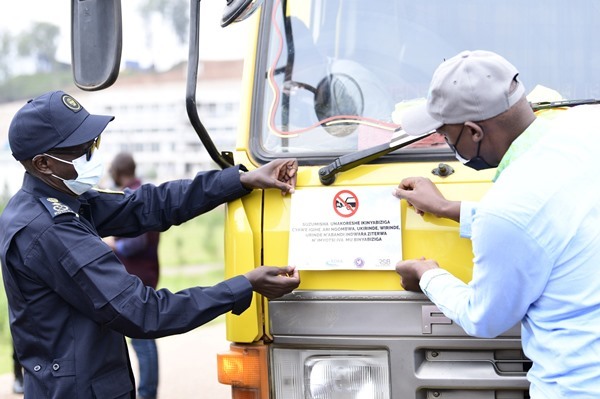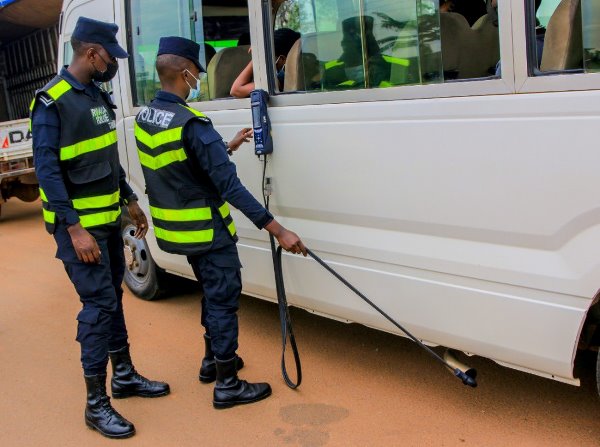
Rwandan car and motorbike drivers, as well as machinery owners, are called on to be part of the solution to air pollution by servicing their vehicles, avoiding unnecessary trips, turning off their engines when stationary and buying electric and hybrid vehicles.
The campaign is a joint initiative of the Ministry of Environment through the Rwanda Environment Management Authority, the Rwanda Standards Board, Rwanda Space Agency and Rwanda National Police.
Rwanda’s First Biennial Update Report under the United Nations Framework Convention on Climate Change (UNFCCC) in December 2021, as well as the Third National Communication in 2018 both indicate that the country’s greenhouse gas emissions from road transport were dominated by cars and motorcycles.
A study published by REMA in December 2017 showed that vehicle emissions are the biggest contributor to poor air quality in Rwanda’s cities.

Most of the time, highly polluting vehicles and machinery are those which have not been properly or regularly serviced or use fuel that does not comply with national standards.
The new campaign, called Ikinyabiziga kizima, umwuka mwiza(Healthy Vehicle, Clearer Skies), encourages owners to service their vehicles and machinery and only purchase high quality fuel. Doing so will not only reduce the greenhouse gas emissions that cause climate change, but also improve the quality of the air we breathe.
“Rwanda has built a nationwide monitoring system that provides real-time data on the quality of the air at twenty-three sites across the country. The system highlights the dominant air pollutants responsible for air quality degradation, and most of those pollutants are related to vehicular emissions and machines using fossil fuels like petrol and diesel. It is everyone’s responsibility to regularly service their vehicles, use fuel complying with national standards, and shift from fossil-fuel powered vehicles to electric vehicles where possible to ensure clean air for all,” said Juliet Kabera, the Director General of the Rwanda Environment Management Authority.
“The number of vehicles on Rwanda’s roads is expected to double by 2030 and so pollution, climate impacts as well as societal costs linked to congestion and health will also rise if we don’t act now,” she added.
During the campaign, mobile emissions testing will be conducted in the City of Kigali as well as Huye, Rwamagana, Musanze and Rubavu districts. The public will also be engaged through radio and TV talk shows, and encouraged to share their personal efforts to #BeatAirPollution on social media.
“The contribution of vehicles to the city’s ambient air pollution cannot be ignored. All motor vehicles in Rwanda are required to undergo emissions inspection and testing at the Motor Vehicle Inspection Centre. Any vehicle that does not meet applicable emissions standards is not authorised to operate in Rwanda. The Traffic Police also has handheld vehicle emissions inspection using mobile equipment for on-the-spot emissions checks,” said CP John Bosco Kabera, Spokesperson of the Rwanda National Police.
Air pollution is the leading environmental threat to human health. Today, 90% of people globally breathe polluted air and approximately seven million people die from air pollution related causes every year.
Air pollution costs the global economy US $5 trillion in welfare costs annually and ground-level ozone pollution is expected to reduce staple crop yields by 26 per cent by 2030.
In Rwanda, more than 2,200 deaths were attributed to ambient air pollution in 2012 and the number of hospital admissions for acute respiratory infections in health centres across the country increased to 3,331,300 in 2015, up from 1,682,321 in 2012.
To improve air quality, the health of all Rwandans and protect our environment, the Government of Rwanda enacted mandatory vehicle emissions testing in January 2015.
In 2019 and 2020, the Rwanda Standards Board published standards for air quality and emissions limits for road vehicles as well as automotive fuels equivalent to Euro 4. Those standards serve as benchmarks for the control of air pollution, testing and inspection of vehicle emissions with a view to protecting the environment, health and safety of the Rwandan population.
Under the Ministerial Order on air pollution and emissions, the owner or operator of a machine using petroleum products must service the machine and maintain it in line with the best technical practices to keep it within the authorised air pollutants emissions limits.
Similarly, under the law on the preservation of air quality and prevention of air pollution in Rwanda, any person owning any means of transport of people and goods which is an emission source must control the production and emission of air pollutants.(End)
